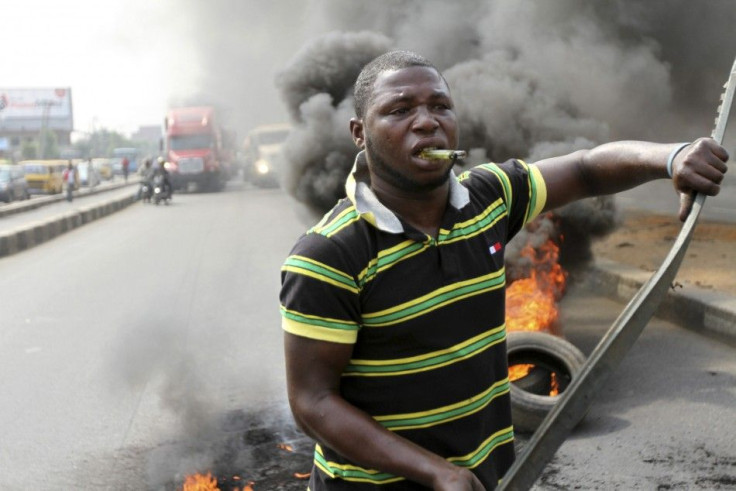Nigeria on Strike: Fuel Subsidy Protests Paralyze Country
The Occupy Nigeria Movement Begins

Thousands of people in nearly every major city in Nigeria took to the streets as part of a planned nationwide strike to protest against the recent removal of a fuel subsidy.
Businesses around the country were shuttered for the 24-hour strike which began on Monday, as marches and demonstrations were organized in public spaces. The latest strike augments a week of protests and are being organized by major national trade unions and the Nigeria Bar Association.
The spirited protests are a response to President Goodluck Jonathan's Jan. 1 revocation of a two-decade old subsidy that had lowered the price of oil for citizens in a country batting widespread poverty. The government claims the the plan would raise $8 billion in revenue that will be invested in infrastructure, but with the majority of Nigerians living on $2 a day, the subsidy lift was an unjustified attack on their livelihood.
Since the subsidy was removed, gas prices have risen from $1.70 to at least $3.50 nationwide. The hike was felt at the pump and also raised the cost of food and transportation.
Aside from marches and organized protests, some Nigerians have taken over gas stations, which had already closed down in advance of the demonstrations, and others burned tires in order to block traffic and stop police advances.
Labor Strike
Last week an industrial court ordered a halt to the nationwide strike, saying that the economic damage it would impart on Nigeria would be too costly, adding that it would also jeopardize the safety for the citizenry as well. The ruling effectively made the strike illegal, although it did not establish how groups breaking the order would be penalized, according to The Associated Press.
The order did give police the legal right to interfere with any protests, a right that they have been using.
Nigeria's federal police promised to protect peaceful demonstrators, but have not been shy about using force against more unruly protests or anyone getting too close to government buildings.
As of 3 p.m. local time, the Red Cross reported that around 30 people were wounded in clashes with police in the city of Kano, where officers reportedly used live fire to push back protestors.
Seven of them have gunshot wounds while the rest sustained injuries from beating and falling down in the confusion. These figures are only from this hospital. We are going to other hospitals where we were told some other people have been admitted, Red Cross official Musa Abdullahi told Nigeria's News24.
Additionally, police used guns and tear-gas to disperse protestors in other cities around the country. According to The Guardian, at least one person died of gunshot wounds in Lagos, and protestors are independently posting photos of bodies online.
Occupy Nigeria
The stated goal of the protests is clearly the re-institution of the fuel subsidy, and secondarily the resignation of Finance Minister Ngozi Okonjo-Iweala. But in a country where recently discovered oil wealth has made the government rich but adversely affected an poverty-stricken populace, the protests speak to a greater discord.
Protestors have already labelled the events a movement, calling it Occupy Nigeria and making comparisons to Egypt's Tahrir Square. As in both the Arab Awakening and Occupy Wall Street, social media has become an important way to spread information, and thousands of people reporting causalities and proclaiming their support on Twitter.
Is this the long-awaited Nigerian Spring? asked the Council on Foreign Relations' John Campbell, a former U.S. ambassador to Nigeria. The conventional wisdom (which I shared but increasingly doubt) is that the country was too divided by religion and ethnicity and with too weak a sense of national identity for a popular opposition movement comparable to those that roiled Tunisia, Egypt or Syria.
The popular movement that Campbell is referring to is Boko Haram, the Islamic rebel group based in the north that has terrorizing the country for the past year.
Until the fuel subsidy imbroglio, Boko Haram was dominating the already religiously-divided national dialog in Nigeria. The group has killed thousands of people in its campaign to turn Nigeria into an Islamic state and a debate over President Jonathan use of a militarized police force has been the topic of much debate. Additionally, with retaliatory attacks on both Christian and Muslims increasing, Nigeria seemed to be on its way to a religious war.
But now, with protests and the strike as relevant in the impoverished Muslim north as in the oil-flush (but still impoverished) Christian south, religious hatred could be set aside for a united response against growing economic disenfranchisement.
In the city of Kano, where three people were shot dead by suspected militants while playing cards outside a Church on Sunday, images of Christian protestors protecting praying Muslims from police -- and then later vice versa -- hit Twitter during Friday's protests.
© Copyright IBTimes 2024. All rights reserved.




















